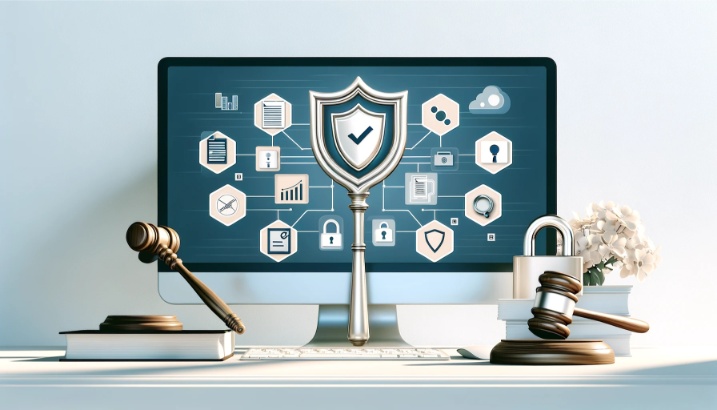Are you struggling to abide by data regulations and maintain clean CRM data? Look no further; CRM data cleansing solutions help in compliance with data regulations. These solutions can help you meet regulatory requirements by ensuring your customer data’s accuracy, completeness, and quality. For example, imagine a scenario where your business receives a data subject access request under the General Data Protection Regulation (GDPR). Effective CRM data cleansing allows you to quickly locate and retrieve the requested information, saving time and ensuring compliance. Regularlyy cleaning and updating your CRM datu can minimize the risk of data breaches, improve customer trust, and demonstrate your commitment to data privacy and protection.
Data Privacy Protection
Ensure your CRM data is protected by implementing data privacy measures with the help of CRM data cleansing solutions. Data privacy protection is critical to data governance and is crucial in preventing data breaches. By adhering to data privacy regulations and implementing effective data cleansing solutions, you can safeguard your CRM data from unauthorized access and ensure compliance with data regulations.
Data breach prevention is a primary concern for organizations today. With the increasing number of cyber threats and the potential impact of a data breach, it is essential to have robust data privacy measures in place. CRM data cleansing solutions can assist in identifying and removing any sensitive or personally identifiable information (PII) that might be present in your CRM database. By cleansing your data, you can ensure that only relevant and necessary information is stored, minimizing the risk of data breaches.
Additionally, CRM data cleansing solutions can help implement data governance policies. These solutions provide tools and processes to monitor and control access to CRM data, ensuring that only authorized individuals can view or modify the data. By enforcing data governance policies, you can establish clear guidelines for data handling and mitigate the risk of data breaches caused by human error or unauthorized access.
Consent Management
How can CRM data cleansing solutions assist you in managing consent effectively for compliance with data regulations? Consent management is a critical aspect of data governance andis cruciale in ensuring compliance with data regulations. With the increasing number of data breaches and the growing importance of data privacy, organizations need robust consent management processes.
CRM data cleansing solutions can help you manage consent effectively by providing tools and functionalities that enable you to capture, store, and track consent in a systematic manner. These solutions allow you to maintain a central repository of consent records, making it easier to manage and monitor the consent status of your customers or users.
Using CRM data cleansing solutions, you can automate the consent management process, ensuring that consent is obtained and recorded in a standardized and consistent manner. These solutions can also help you enforce data privacy policies and ensure that consent is obtained before processing personal data.
Furthermore, CRM data cleansing solutions provide auditing capabilities, allowing you to track and document consent changes, withdrawals, or updates. This helps you maintain an accurate and up-to-date record of consent and demonstrates your commitment to data protection and compliance.
Data Encryption
CRM data cleansing solutions offer robust data encryption features to protect sensitive data and meet compliance requirements. Data encryption is crucial in safeguarding data from unauthorized access and ensuring its confidentiality. Here are three key benefits of data encryption in CRM data cleansing solutions:
-
Enhanced Security: Data encryption converts sensitive information into an unreadable format that can only be decrypted with the appropriate encryption key. This adds an extra layer of security and helps prevent unauthorized access to the data. Even if a data breach occurs, the encrypted data remains protected and inaccessible to attackers.
-
Compliance with Data Regulations: Many data regulations, such as the General Data Protection Regulation (GDPR), require organizations to implement adequate security measures, including data encryption, to protect personal and sensitive information. By using CRM data cleansing solutions with encryption capabilities, businesses can ensure compliance with these regulations and avoid penalties or legal consequences.
-
Protection against Data Breaches: Data breaches can have severe consequences, including financial losses, reputational damage, and legal liabilities. Encrypting data stored in CRM systems makes it significantly more challenging for hackers to access and misuse the information in case of a breach. Even if the encrypted data is compromised, it would be useless without the encryption key for decryption.
Data Anonymization
Data anonymization is a crucial aspect of legal data protection measures organizations should implement to ensure compliance with data regulations. By anonymizing data, personal information is stripped of identifiable details, reducing the risk of privacy breaches and maintaining data security. This practice not only safeguards the privacy of individuals but also helps organizations mitigate potential legal and financial consequences associated with non-compliance.
Legal Data Protection Measures
By implementing legal data protection measures such as anonymization, you can ensure compliance with data regulations and safeguard sensitive customer information. Data anonymization removes or encrypts personally identifiable information (PII) from datasets, making it impossible to identify individuals. Here are three reasons why data anonymization is crucial for compliance and data protection:
-
Mitigating data breach consequences: Data breaches can lead to severe consequences, including financial losses, reputational damage, and legal penalties. By anonymizing customer data, you reduce the risk of exposing sensitive information and minimize the potential harm caused by a breach.
-
Enhancing data breach prevention: Anonymized data eliminates the risk of unauthorized access to personal information, reducing the likelihood of a data breach. Implementing a robust data anonymization technique strengthens your data security measures and protects against potential cyber threats.
-
Preserving data utility: While anonymizing data ensures compliance and security, it also allows organizations to utilize the data for analysis, research, and business purposes. Organizations can still derive valuable insights by preserving data utility without compromising customer privacy.
Implementing data anonymization measures is crucial to ensuring compliance with data regulations and safeguarding customer information.
Privacy and Data Security
Protect customer information and ensure compliance with data regulations by implementing CRM data cleansing solutions prioritizing privacy and data security. Privacy and data security are crucial aspects of data regulations, as organizations must safeguard customer information from unauthorized access and prevent data breaches. CRM data cleansing solutions are vital in achieving these objectives by implementing robust data access control mechanisms. These solutions enable organizations to control who can access sensitive customer data, ensuring only authorized personnel can view and use it. Data anonymization techniques can also enhance privacy and data security further. Organizations can remove personally identifiable information by anonymizing customer data, minimizing the risk of data breaches, and protecting customer privacy. Implementing CRM data cleansing solutions that prioritize privacy and data security is essential for organizations to comply with data regulations and safeguard customer information.
Data Audit Trails
Regarding data audit trails, tracking any changes made to the data within a CRM system is crucial. This allows for a thorough understanding of how the data has been modified over time and ensures data accuracy. Compliance documentation is required to demonstrate that the necessary steps have been taken to maintain data integrity and comply with data regulations.
Tracking Data Changes
You must implement CRM data cleansing solutions to effectively track data changes and maintain audit trails. These solutions offer a variety of features and functionalities that enable you to monitor and track any changes made to your data effectively. Here are threecriticaly ways in which CRM data cleansing solutions can help you track data changes:
-
Real-time monitoring: CRM data cleansing solutions provide real-time monitoring capabilities, allowing you to track data changes as they occur. This ensures that you have up-to-date information about any modifications made to your data.
-
Change history: These solutions maintain a comprehensive change history for each record, allowing you to view and track all modifications made to the data over time. This enables you to identify any unauthorized changes or discrepancies.
-
Data synchronization: CRM data cleansing solutions offer data synchronization capabilities, ensuring that any changes made to the data in one system are automatically reflected in other connected systems. This helps to maintain data consistency and accuracy across different platforms.
Ensuring Data Accuracy
To ensure accurate data records, you must consistently monitor and track changes made to your data using CRM data cleansing solutions. Data validation is an essential step in this process, as it ensures that the data entered into the CRM system meets the required standards and is free from errors or inconsistencies. By implementing data validation rules, you can prevent incorrect or incomplete information entry, reducing the chances of data inaccuracies. Additionally, duplicate identification is crucial for maintaining data accuracy. Duplicate records can lead to confusion and inconsistencies in the system, impacting decision-making and customer interactions. CRM data cleansing solutions help identify and merge duplicate records, ensuring your data remains accurate and current. By actively monitoring data changes, validating incoming data, and identifying duplicates, you can maintain reliable and accurate data records in compliance with data regulations.
Compliance Documentation Required
To maintain compliance with data regulations, you must ensure the availability of compliance documentation, such as data audit trails. These audit trails provide a comprehensive record of all data-related activities, providing a clear and detailed account of who accessed, modified, or deleted data and when. Compliance documentation is crucial in demonstrating adherence to data regulations during a compliance assessment. Here are three key reasons why compliance documentation, specifically data audit trails, is required:
-
Transparency: Audit trails enable organizations to track and trace data movement, ensuring that all actions are accounted for and can be audited if necessary.
-
Accountability: Data audit trails establish accountability by attributing actions to specific individuals or roles, allowing organizations to identify unauthorized or inappropriate activities.
-
Data Classification: Compliance documentation, including audit trails, helps in data classification by providing insights into the sensitivity and criticality of data and assisting in implementing appropriate security measures and access controls.
Data Retention Policies
Use CRM data cleansing solutions to ensure compliance with data regulations by implementing effective data retention policies. Data retention policies are essential for organizations to manage their data in a way that meets legal and regulatory requirements. These policies outline the rules and procedures for storing and retaining data and the timeframe for data deletion. By establishing clear and well-defined data retention policies, businesses can minimize non-compliance risk and potential penalties.
Effective data retention policies should include guidelines for data deletion procedures, ensuring that data is securely and permanently erased when it is no longer needed. This helps organizations avoid storing unnecessary data, reducing the risk of data breaches or unauthorized access. Data storage limitations should also be defined to prevent accumulating excessive and outdated data. These limitations can help organizations optimize their data storage resources and reduce costs associated with storing unnecessary data.
Implementing CRM data cleansing solutions can greatly assist organizations in adhering to data retention policies. These solutions can automate identifying and deleting outdated or unnecessary data, ensuring compliance and maintaining data integrity. Businesses can comply with data regulations and protect sensitive information by regularly cleansing and managing their CRM data.
Frequently Asked Questions
What Are the Potential Consequences for Non-Compliance With Data Regulations?
Not complying with data regulations is like driving without a seatbelt – the potential consequences are severe. It’s crucial to understand the importance of compliance to avoid fines, legal actions, reputational damage, and loss of customer trust.
How Can CRM Data Cleansing Solutions Ensure the Accuracy and Integrity of Customer Data?
CRM data cleansing solutions ensure the accuracy and integrity of customer data by identifying and resolving data errors, duplicates, and inconsistencies. This improves data quality management and brings various benefits, such as improved decision-making and customer satisfaction.
What Are the Key Considerations When Selecting a CRM Data Cleansing Solution?
When selecting a CRM data cleansing solution, key considerations include data security and privacy. You must ensure the solution meets regulatory requirements and protects sensitive customer information from unauthorized access or breaches.
Can CRM Data Cleansing Solutions Help in Compliance With Data Regulations for International Organisations Such as GDPR or CCPA?
CRM data cleansing solutions can help you ensure data security and comply with international data regulations like GDPR or CCPA. Removing duplicate or outdated information can protect customer data and improve their experience.
Are There Any Industry-Specific Regulations or Guidelines Organizations Should Be Aware of When Implementing CRM Data Cleansing Solutions?
When implementing CRM data cleansing solutions, being aware of industry-specific regulations is crucial. For example, GDPR and CCPA compliance are essential for organizations to ensure data privacy and avoid penalties.




